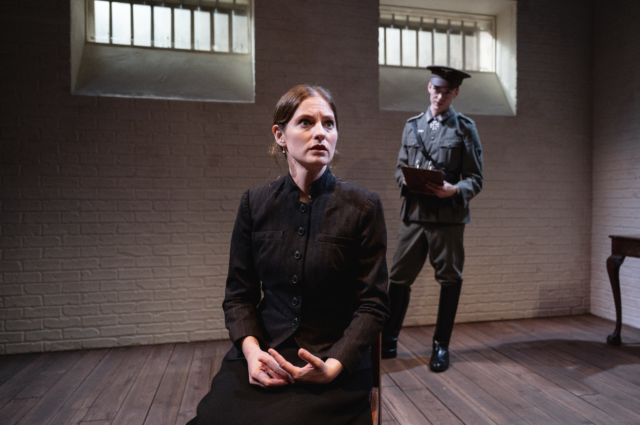
Jenny Lyn Bader’s Mrs. Stern Wanders the Prussian State Library explores a little-known part of the life of Hannah Arendt, portrayed by Ella Dershowitz (photo by Valerie Terranova)
MRS. STERN WANDERS THE PRUSSIAN STATE LIBRARY
59E59 Theaters
59 East 59th St. between Park & Madison Aves.
Through November 10, $44
212-279-4200
www.59e59.org
“Personally I think that is the first big mistake in the history of thought — that truth comes at the end. I think truth comes at the beginning of a thought,” the title character says in response to a prison guard’s question about hidden truth in Jenny Lyn Bader’s outstanding drama Mrs. Stern Wanders the Prussian State Library, which opened Thursday night at 59E59 for a limited run through November 10.
The show takes place in 1933 Berlin, where twenty-six-year-old burgeoning historian, philosopher, and author Hannah Arendt — her married name at the time was Stern; she and her first husband, Günther Anders Stern, would divorce in 1937 — has been arrested by the Gestapo and is being held in a dank cell. She is visited several times a day by Karl, an inquisitive guard who appears to be just as interested in her philosophy as in the identities of her dissident, Zionist friends; he also gives her updates on how her mother, who is in a different cell, is doing, although sharing such information is against the rules. The terrific cast features Ella Dershowitz as Hannah, Brett Temple as Karl, and Drew Hirshfield as a lawyer; the play, which resonates with the rise of antisemitism in today’s world, is beautifully directed by Ari Laura Kreith, with an immersive set by Lauren Helpern. Coincidentally, the load-in for the production was done on what would have been Arendt’s 118th birthday, on October 14.
A prolific award-winning playwright who graduated from Dalton and Harvard, Bader (The Whole Megillah: A Purim Spiel for Grown-Ups, None of the Above, Manhattan Casanova, In Flight) has written more than thirty full-length and short works, including ten virtual presentations, in addition to numerous essays and the web serial drama Watercooler. She and her husband, author and educator Roger Berkowitz, are raising two children on the Upper West Side.
Berkowitz and Bader will team up for a talkback following the 7:15 performance of Mrs. Stern Wanders the Prussian State Library on November 3; there will also be talkbacks with Mark Schonwetter, Ann Arnold, and Isabella Fiske on October 29 (7:15), Bader on October 30 (2:15) and November 7 (2:15), and Bader and Dawn Tripp on October 30 (7:15).
I recently spoke over Zoom with Bader, who is a friend of mine and my wife’s, discussing Hannah Arendt, misquotations, the playwriting process, and the search for the truth.
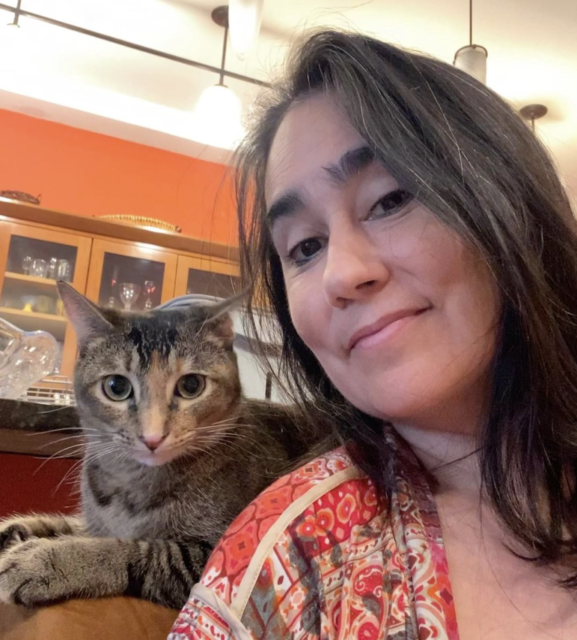
“I have a pandemic cat. She’s absolutely wonderful. It was my daughter who insisted on getting the cat, and now I’ve become obsessed with her. That’s what happens,” Bader explains about Terry, who is half Abyssinian and half Bengal (photo courtesy Jenny Lyn Bader)
twi-ny: What was the genesis of the project?
jenny lyn bader: I was at a meeting at the League of Professional Theatre Women. We used to have something called the Think Tank. I was at a Think Tank meeting and my friend Cindy Cooper said to me that she was curating an evening called “More Jewish Women You Should Know” at the Anne Frank Center because she had done an evening called “Jewish Women You Should Know,” and it had been so popular that the center asked her to bring “More Jewish Women” there.
She asked me if I was writing anything about a Jewish woman, and I said, Yes, I was working on something about some obscure housewives who had been part of the antinuclear protest movement. And she said, No, they can’t be obscure. It has to be a woman with an image and a name and do you have anything like that? And I said I don’t, and that could have been the end of the conversation, but I said, But I could write something for the occasion. And this was interesting because everybody else was doing an excerpt of a project they were already working on, and here I was, I had nothing. And she said, Okay, who? And I suggested a couple of people, and I think the third person I suggested was Hannah Arendt. I said, I have a lot of her research materials and a lot of books written by her and about her in my home.
I’ve also attended an alarming number of conferences inspired by Hannah Arendt. I’m an adviser to the Hannah Arendt Center and have been involved with it and been there a lot even before joining the board of advisers because my husband, Roger Berkowitz, founded the Hannah Arendt Center for Politics and Humanities at Bard College. So I am very steeped in her thinking all the time. Roger has a weekly reading group, and people come from all over the world, from different countries, time zones, to discuss reading Arendt. I’m often on that Zoom meeting, but I also can sometimes hear the meeting in my apartment even if I’m not signed on. So I’m very submerged in the world of Hannah Arendt, by osmosis and more proactively depending on the time of day.
I suggested Hannah Arendt. She said, Okay, Hannah Arendt, I like that. The next time I saw her, she handed me a flyer and said, Oh, here’s the flyer for our event. And it said, “More Jewish Women You Should Know: Readings of Excerpts of New Plays at the Anne Frank Center.” And there were these photographs of four important historical women: Emma Goldman, Emma Lazarus, Gisa Konopka, Hannah Arendt. And it had the names of four playwrights and these four historical women — and it was in six weeks. I’ve had this happen before, where the brochure preexists the script, but that usually happens in a situation where I know the exact goal of the script or if it’s a commission, what it’s supposed to be about.
Here I only had a character, but I didn’t know if I was writing about her when she was old or young or what was happening. I had a subject, but I didn’t have the subject. So now I had to figure out what the play was about. I was going to see another show of mine in Boston with my husband, and we were taking the Acela, so we had a few hours and I said to him, I’ve got this flyer, this thing is happening. Everyone else has a full-length play. I’ve got nothing. What do you think is the most dramatic thing that ever happened to Hannah Arendt? And it can’t be the [Adolph] Eichmann controversy; there’s already a movie about that. And it can’t be the [Martin] Heidegger relationship, because there’s already a play about that.
And Roger said, Huh, I think it’s probably her experience with Jewish Cultural Reconstruction, Inc., this committee after the war that decided what happened to all of the Judaica and where everything went. So it was a very emotional experience for her. She returned to Germany after the war and sat on this committee and had to decide whether to see Heidegger while she was there and decide where things went and heard more about what had happened to her friends. It was a lot.
Roger starts telling me about this for a couple of hours and I’m taking all these notes, and then, as the train pulls into the station, he says, There was that time she was arrested. That week I started to try to write the Cultural Reconstruction play, but I wasn’t finding my way into it. I couldn’t figure out whether it started on the airplane or back in Germany or in a conversation with which characters. I just couldn’t find the shape of the play. The play was not writing itself, it was not doing that for me. And I believe that a really good idea writes itself.
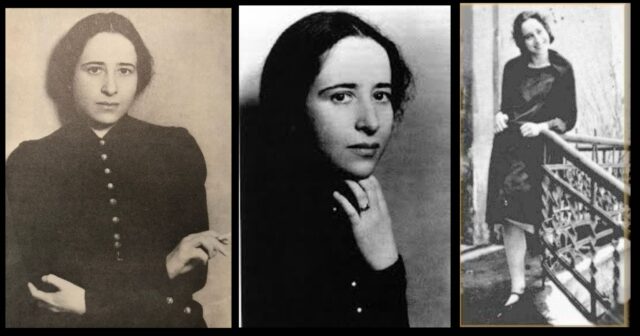
Hannah Arendt was born in Germany in 1906 and died in New York City in 1975
twi-ny: Did you feel, at that point, that you were on the right track even though it wasn’t writing itself?
jlb: No. After a couple of hours I kind of gave up on this play and I thought, Well, I have to find another subject. What is this thing about her being arrested? I’ve never heard of it. I know Hannah Arendt scholars, I know people who knew Hannah Arendt. I’ve talked to a lot of people about her. I’ve been to many conferences at the Arendt Center, not necessarily about her work but inspired by her work in some way. I’ve been in the orbit of Hannah Arendt for a while, but I did not know that she was arrested when I began this project. And one reason I didn’t know was that it was not something she talked about a lot. She really didn’t mention it during most of her life because after the war, people didn’t really talk about their stories. Gruesome things happened to people and they didn’t want to talk about that.
And then less gruesome things happened and those people didn’t want to tell their story because it wasn’t as gruesome. They felt it wasn’t significant. In fact, she says in the interview she gives where she finally does tell the story, “What actually led me out of Germany I never told since it’s so inconsequential.”
Miraculously, I immediately picked up and found the one book where she mentions this, and it was in this 1964 interview with Günter Gaus, which you can watch online now, but you couldn’t at that time.
[ed. note: You can also watch Arendt’s last interview, in 1973 with Roger Errera, here.]
twi-ny: I looked at some of it. It was amazing to be able to see her talk, casually smoke her cigarette.
jlb: Yes! So I read this interview, and in the interview she says she was arrested by a young man with a decent, open face who had been working for the criminal police, had just got promoted to the political police, doesn’t really know what to do with her and has to figure out how to charge her. This is so different from his last job. And a little more, but I don’t want to say too much for those who haven’t seen it, about exactly what happened. And I thought, Well, there’s your play.
twi-ny: There it is.
jlb: Yeah. And I started writing it. That first version just had two characters, and I brought it into my writers group, the Playwrights Gallery, and two actors read it. I asked those two actors to do the reading at the Anne Frank Center that was coming up the following week. And then the actress dropped out the night before; she got a better-paying job that conflicted.
So I ended up being in that first reading myself. I had this two-character short play that some people thought was an excerpt. This is like the downtown Manhattan version of Hamilton at the White House story, right? They had a song and they said it was from a musical, but there was no musical. I had this scene that I told people was from a play, but I didn’t have the play; I didn’t know what the play was yet. I only knew what that scene was.
So I ended up doing it that night. People would say, This is a really interesting premise; you should expand this play! But I couldn’t figure out how to expand it because a short play doesn’t always turn into a long play. And also it was hard for me to evaluate the short play because after that first performance, people kept inviting me to perform it myself, with a guy playing the officer. So I never saw it because I was always in it. I was always performing it. And then one day there was a festival about Jewish women from history at the Museum of Jewish Heritage, and one of the organizers asked me, Could we do your Hannah Arendt piece? I said, Yes, but I’m going to be out of town. And they said, Oh, that’s okay. We don’t want any playwrights acting in their own pieces in this festival. And I said, Fine. They actually cast Kate Hamill.
twi-ny: Wow!
jlb: Kimberly Eaton directed that version, and she cast Kate Hamill, who also has a play coming up at 59E59 Theaters this season [The Light and the Dark (the life and times of Artemisia Gentileschi), starting November 2]. She’s an absolutely wonderful actress. She did the scene and I saw her, she was a very tiny, tiny Kate Hamill on my Zoom screen, where I was watching from out of town; I participated in the Zoom rehearsal, and then I came back into town and there was some kind of miracle where there was a blizzard on the day of the festival and it was entirely postponed. So I thought I was going to miss it, but I actually saw it because it happened three days later and I got to see Kate Hamill do the scene and I watched it and I thought, Oh my gosh, I know how to turn this into a full-length play.
There’s a third character, and I know who he is, and he’s mentioned twice in that original interview, but not in the way I’m going to dramatize it. There are two references to attorneys in that interview, but I’ve hit upon a way of adding the attorney that changes the shape of the play.
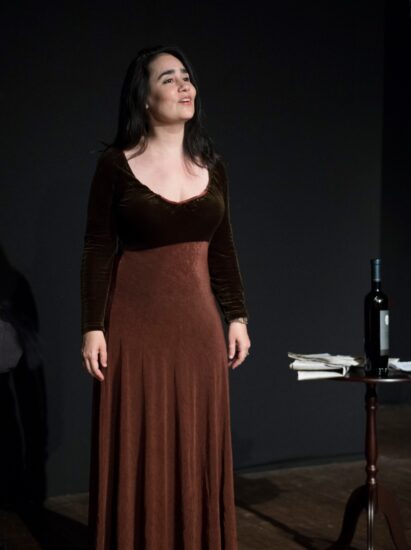
Jenny Lyn Bader starred in her solo play Equally Divine: The Real Story of the Mona Lisa in 2019 at Theatre Row
twi-ny: Yes, it does. What’s that feeling like?
jlb: Oh, I mean, it’s absolutely wonderful. I’m a big believer in the unconscious mind and in the subconscious mind. Sometimes I’ll go to sleep thinking about a problem and I’ll wake up and I’ll have dreamt the answer. I believe we need to court our subconscious, bring lattes to our subconscious, whatever you need to do just to be tapped into that. Playwriting is a really unusual kind of writing because so much of it has to do with reading aloud and being in a role. And so I find if I participate in a developmental reading of a play of mine and I play a role, I mainly get insight on how to develop that role, how to develop that character, what they would say, what they would not say, what are the emotional transitions, are they logical, or are they emotionally justified. But I don’t necessarily get an insight into the whole.
It helps to watch different people in the roles, although sometimes the best ideas come when you’re not watching, you’re just thinking about something else or going somewhere. I find sometimes just changing locations is really important when you’re trying to spur on the creative process. The first play that I wrote that was produced in New York I got the idea for on the crosstown bus; just being in motion or going to a new place. When you’re stuck, it can be good to leave your office and go out in the world.
twi-ny: Prior to your knowing Roger, were you already a Hannah Arendt fan? Did you know a lot about her or was it through your relationship with him?
jlb: Prior to knowing Roger, I think I had only read Eichmann in Jerusalem, but I was familiar with her in general, what people said about her. I’d seen a lot of stuff about her. Now there are five documentaries, a couple of plays, a biopic. I was aware of her in the cultural imagination, and I had read about The Origins of Totalitarianism. I don’t think I had attempted to read it — it’s a very intense book — yet it’s become, in recent years, a bestseller in the United States, years after she wrote it. [The book was published in 1951.]
It’s just full of wisdom for us today. I should mention that there’s a quotation that has gone viral recently on the internet, and it had at one point more than fifty thousand downloads just on one of the social media sites, and it’s a misquotation. Roger actually wrote a piece about how it was a misquotation.
Shortly after that, I saw it misquoted again, this time with a photo of someone who is not her. I thought, What is this? Why are people doing this? Why do we want her to have written with less complexity and nuance than she did? And why do we want her to look different than she did? What is this strange way that she’s getting refashioned by social media?
twi-ny: I read that piece; it’s the quote about constantly lying.
jlb: The other day I noticed it was Eugene O’Neill’s birthday and I wanted to post something about it. I looked for a quotation, and there were so many things that he did not say attributed to him.
twi-ny: There are sites dedicated to things Abraham Lincoln, Albert Einstein, Mark Twain, Benjamin Franklin never said. Has the play changed in the five years since it premiered at Luna?
jlb: Yes. Yes, it has. I mean, it’s the same, but as you work on a play, you make more discoveries, especially when you’re working with a director like Ari Laura Kreith, who does very deep exploration. We had a wonderful rehearsal process. The play at Luna was five scenes, and this version is six scenes. So one of the scenes has been broken up in a way that I think is more effective for the dramatic arc. And then there were still a couple of lines in there that were holdovers from the short piece, which sort of gave too much away early. So there’s been a little bit of tweaking and restructuring, I would say.
But I was very proud of the version that was at Luna. I was considering sending it out to publishers, but I always try not to do that until two, possibly three productions in, because you always make changes. I always say, look at Sam Shepard. He won the Pulitzer, and seventeen years later he totally rewrote Buried Child. You never know what it’s going to be. Plays are living; they are alive.
twi-ny: Ella is a tremendous Hannah Arendt. What was the casting like?
jlb: Brett did the play in New Jersey, so he was a real find in 2019. So that was set; we didn’t have auditions for his role. This time around we only auditioned potential Hannahs and potential Erichs. It was very exciting when Ella came into the room.
twi-ny: It clicked right from the start.
jlb: I am a big crossword puzzle fan, so when I saw that she was a crossword constructor in her spare time — some people wait tables, she constructs crosswords for the New York Times, Wall Street Journal, and Los Angeles Times. Also on her resume it said she had studied philosophy and psychology at Yale, which is not the kind of thing that usually gets you an acting job, but in this case I found it really impressive. And she’s just a transformational actress.
So I was very excited about the audition, but I was also nervous. I really thought this was cool that she was a crossword constructor, but was I biased toward her? She was blonde at the time. Was the blonde hair going to be an issue? Everybody knows what Hannah Arendt looked like. I said to the casting director, What are the rules about that? What is the proper way to ask her if she would be willing to dye her hair? The rules were explained to me. But then the next time Ella walked into the room, five minutes later before she left she said, By the way, I’m willing to dye my hair. So she removed the final obstacle, but I don’t know, she’s just a really special, vulnerable, riveting actress.
twi-ny: Definitely.
jlb: And Drew, playing the attorney, that’s a really hard scene actually. Drew makes it look easy, but he just walked in and gave one of the best auditions I’ve ever seen. He has a few minutes to establish the main conflict of the play, the main dilemma. A lot of the burden of the play’s climax rests on his performance. And of course, Brett is just extraordinary in portraying the inner conflict of the police officer, with some kind of humanity.
twi-ny: Which is not how we think of Nazi prison guards.
jlb: It’s funny. A lot of people come up to me after the play and say, Oh, I really like the Nazi. But he’s not technically a Nazi. He was a member of the criminal police; the Gestapo had just started that week and had not been fully “Nazified” yet, so we still have him in last week’s uniform.
twi-ny: There is no swastika on it.
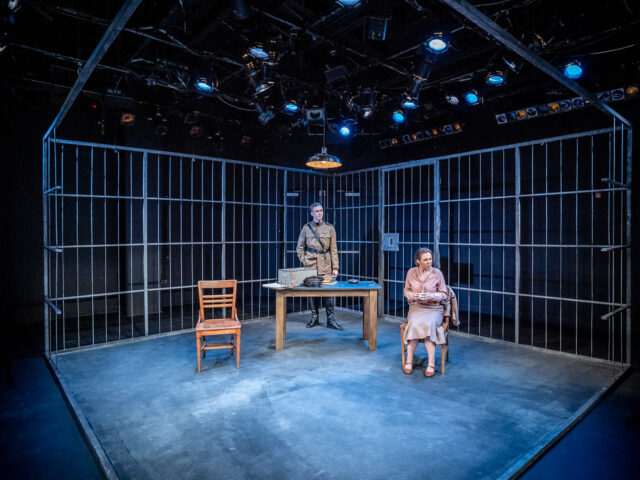
Mrs. Stern made its Luna Stage debut in 2019, with Brett Temple as Karl Frick and Giuliana Carr as Hannah Arendt (photo by Mike Peters / Montclair State)
jlb: In the 2019 production, we did have a swastika, and it was not historically accurate, but the design team felt it would give people the right vibe. The play now looks like it’s set in a Gestapo cellar, which is, I think, where she would’ve been. In the 2019 production, they made it a jail with bars. They thought that conveyed the sense of being imprisoned. So there were certain dramatic liberties taken in the design.
What’s interesting about this period is there isn’t yet a swastika on everything. There’s about to be. We’re in the last vestiges of the old Germany. But I think the audience sees the swastika even if it’s not there.
twi-ny: And the swastika is mentioned in the dialogue. Speaking of libraries, another part of the play that works so well is how relevant it is to what’s happening today, with banned books and parents and schools deciding what all kids can and can’t read. That’s always a bad cultural sign. Was that consciously done in the writing?
jlb: I feel that suppression of thought leads to suppression of people, and that leads to violence. I think that is at the core of this story and of what happens to her. I was thinking about trying to send this play to a festival that said “no Holocaust plays.” And I said to myself, Well, this is not actually a Holocaust play. Maybe I can send it. Right? This is pre-Holocaust. Nobody’s being put in a gas chamber. Someone is being questioned, but this play has some comedic elements, and maybe this festival that doesn’t want Holocaust plays would read it.
But then the play was featured in a source book called Women, Theater, and the Holocaust, and someone suggested that the play be listed in it, and it now is. So it’s both not a Holocaust play and a Holocaust play in the sense that this is the kind of thing that leads to much darker things.
When you start saying what people can read and you make it illegal for them to distribute materials about antisemitism and hate, and you make it illegal for them to do that the day after they already did it, it’s very scary.
twi-ny: Fifteen or twenty years ago, I don’t think Arendt would’ve been as well known as she is today. So even for people who think they know her through books and movies and other plays, what do you think they will learn from yours?
jlb: Well, I think that often there is a tendency to talk about women through men and through their relationships with men and what they have said about men. And part of that is the problem of sexism and misogyny in general; who wants a story about a woman? Oh, there’s a man in it. Okay. So it was interesting that at our first talkback, there was a question about Heidegger, who had nothing to do with the play. It torpedoed the conversation momentarily. In our second one, there was a question about Eichmann.
I’ve written about neither of those people. It could be argued that there are references or connections in the play to both of those people, but they are not characters in the play. The play is not about them. The play is about a woman, and a woman who was extremely courageous and who was very perceptive about what was going on in her time and who was really able to talk to anybody, even her prison guard. And she’s this incredible human being who has written some controversial things.
She managed to write thirty books and to have a huge number of insights, very, very wide-ranging ideas, and she’s multidisciplinary. She doesn’t just stick to one field. She’s taught today in philosophy programs, in politics programs and literature and genocide studies and Jewish studies. You can find her work across humanities disciplines, and you can find people in different walks of life who are deeply influenced by her work. I’ve met doctors, lawyers, scientists, psychologists who say that Arendt has been a big influence on them.
What I do is I show her when she’s twenty-six years old, when she already has a kind of ethical and moral backbone that is extraordinary and the social gifts and the wit that are legendary. She hasn’t written all thirty books yet, but what I decided at a certain point is that she’s already thinking about them. She’s already starting to figure them out. So I decided it’s all there. In some ways, this situation is giving her ideas for more books.
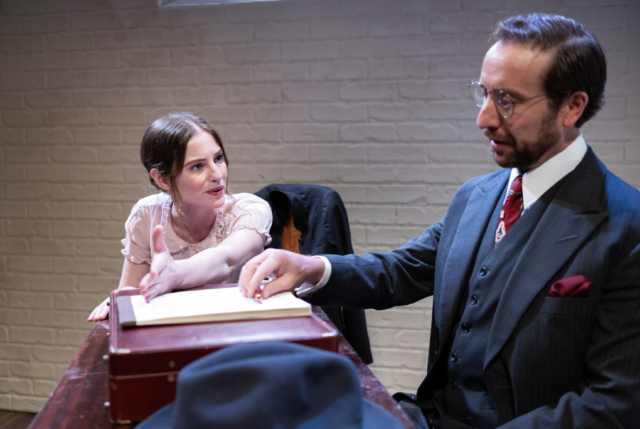
Hannah Arendt (Ella Dershowitz) is visited by a lawyer (Drew Hirshfield) in gripping play by Jenny Lyn Bader (photo by Stephanie Gamba)
twi-ny: In addition, the thing that is key for her, even more important than herself, is her mother, who’s also imprisoned. She’s more concerned about her mother’s safety and well-being than her own. And not everybody’s going to feel that way when they’re locked up in a dungeon.
jlb: When you write a play that’s about a [fictional] brilliant woman, a random, brilliant, strong woman, you’re going to get a lot of feedback. Like, Oh, did this person really do that? Can’t you make this character more soft or whatever. Whereas if you write about a real person, you don’t get these sexist critiques of the brilliant woman. She really did exist. So there’s something especially exciting about this story, this story that’s centered on a woman, but it’s not about being a woman. It’s not about having a relationship with a man. It’s about a person who is a human being who understands what it means to be a human being and understands our common humanity.
This connects back to what you asked me earlier about getting ideas. And that actually happens in the play. You watch her getting ideas and you see her coming up with ideas and realizing she may be executed before she gets to write them.
twi-ny: Right. And even though you know that she isn’t going to get executed, you still have this fear, this tension.
jlb: There’s several weird things about this play, Mark. One weird thing I learned was at the first public reading of the play, at Urban Stages. I had no idea how suspenseful the play would be. There were a whole bunch of people there who were on the board of the Arendt Center, or went to conferences regularly at the center, who knew full well that Hannah Arendt was not executed for treason, but they were on the edge of their seats, worried about her; because, sitting in the audience, we know she survived, but we don’t know exactly how.
And there’s just the suspension of disbelief when you go into the world of the play. Even people who absolutely know better were taken into that suspense. So that was a surprise to me. And then another surprise was how we live in a very politically polarized world, and Hannah Arendt is one of those thinkers who asks us how we can all talk to each other, how we can talk across ideological divides, how we can find common ground with those who disagree with us. And that’s a very important thing that people are talking about now who are influenced by her work.
You asked if I had intended it being a story about the suppression of thought and all of the censorship that’s happening today. And yes, I did intend those things. What I didn’t intend was that I would somehow hit upon the common ground between left and right that people keep talking about in this country. There’s no common ground. Well, people who are leftist activists and conservative activists have both embraced this play.
twi-ny: There’s hope for our future.
jlb: I feel like they now have something in common, and now we can begin a conversation.
[Mark Rifkin is a Brooklyn-born, Manhattan-based writer and editor; you can follow him on Substack here.]